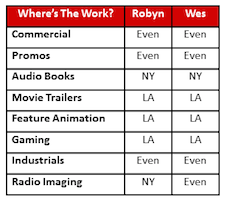Voice actors often come to a crossroads as to whether the west coast or east coast will provide the most fertile ground for a gainful career, or whether they can truly live their dreams outside of these two media behemoths. New York and Los Angeles are generally the cities in question, though solid opportunities abound in Chicago, Atlanta, Miami, Dallas and elsewhere. The good news is that you can have success on either coast, and being bicoastal or multi-regional is a growing reality, even if a virtual one. For most folks this quandary has to do with L.A. and N.Y. The challenge is taking a hard look at the differences between the two regions as they relate to your skill set, personal resources, lifestyle, and networking style. One of our readers, PaSean Ashley, framed her dilemma this way:
 “I have been voice acting for almost 20 years—the last 15 in L.A. Is there a difference with L.A. and N.Y. in terms of VO styles? I am with VOX here in L.A., and Paradigm in N.Y. I have booked one Disney show, one commercial, and a few radio spots in the 15 years I’ve been here in L.A, and haven’t booked anything in the past 5 years. A few years ago, while in N.Y. for the summer, I booked three spots. It left me wondering why I book in N.Y. and not L.A. By the way, I average about two VO auditions a month, with some months nothing. What do you think?”
“I have been voice acting for almost 20 years—the last 15 in L.A. Is there a difference with L.A. and N.Y. in terms of VO styles? I am with VOX here in L.A., and Paradigm in N.Y. I have booked one Disney show, one commercial, and a few radio spots in the 15 years I’ve been here in L.A, and haven’t booked anything in the past 5 years. A few years ago, while in N.Y. for the summer, I booked three spots. It left me wondering why I book in N.Y. and not L.A. By the way, I average about two VO auditions a month, with some months nothing. What do you think?”
The good news is that there’s no “VO style” difference between L.A. and N.Y. when it comes to performance. The script and the director’s vision inform the style, just as they do in a film or theater play. “Conversational, natural, real” and “non-announcer-y” are clearly among the preferred baseline descriptions for most VO projects. This could be said to be the general style of the times. Beyond that, style falls under descriptions like, humorous, quirky, urgent, sexy, authoritative, etc., and they apply across the nation.
To provide a broader perspective on distinguishing between east coast and west coast, let’s turn to the vast experience of two extraordinary voiceover agents who live and breathe this business every day of their lives: Wes Sevens, CEO and founder of VOX, Inc. in Los Angeles, and Robyn Stecher, executive vice president of Don Buchwald and Associates in New York.
VO EXCHANGE: What do you perceive to be a significant difference between how voiceover careers manifest in the Los Angeles market vs. New York?
Robyn: I do not believe there is a difference. The practices that most agents employ in securing relationships are seemingly equipoised on each coast.
Wes: Historically, the Los Angeles market was more anonymous with the actors auditioning in offices and at a handful of casting offices, and their reads being submitted en masse to an agency or buyer. Alternatively, in New York, which has been a smaller pool, performers had the advantage of interfacing with the buyer at the agency or with casting directors directly, and building relationships within that.

VO EXCHANGE: Are there differences in the way Los Angeles and New York-based agents interact with talent?
Robyn: I am not particularly aware of any vast difference. The client-agent relationship is founded in a fiduciary responsibility. That is consistent regardless of coast. The style of individual agents may vary agent to agent and agency to agency. Some agents see their clients more than others. Some agents encourage personal and more visceral interaction while others prefer a more remote relationship. Technology has certainly changed the entire industry, and therefore, the frequency with which some agents and clients see each other in person.
Wes: The differences are more agency by agency than market by market. All the markets have become increasingly similar as home studios and technology continue to speed the process of erasing geographic differentiation. Great talents have come out of both pools equally and from many places in between.
VO EXCHANGE: When taking on a new voice talent, how much does it matter to you if he or she lives in another state?
Robyn: It depends on how the client needs to be marketed. The client’s location will certainly factor in more if we feel that client is destined for a career predominant in commercials. The New York market still utilizes local casting directors that will have some impact on that client’s career. Additionally, we recommend that clients come into our studio for in-house auditions so that our director can interact personally with them. This way we can manage the process while developing a client; whether working with our established clients or taking on a new one. If the client’s career is multidimensional it would matter less that they be located in New York City.
Wes: It doesn’t. We have clients in foreign countries and at least one client who is out of state and blind, to boot. Technology has erased this barrier in most markets. Animation and gaming can be trickier long distance.
VO EXCHANGE: How would you guide a voice actor who’s trying to determine whether to locate his or her business in New York or Los Angeles?
Robyn: I would suggest the performer pick a location that will suit their lifestyle, personal taste, other career goals, and where they feel most happy.
Wes: Not an issue. Just get a home setup, get a demo, start networking, and reading! You could live anywhere if you’ve got the right equipment—personally (your pipes) and technically (your home studio). All that said, it’s hard to get down on your career when it’s 72 degrees and its sunny 350 days of the year.
 It’s plain to see that the reasons behind why one might book more in one market over another contain far too many variables to draw a general conclusion. At the same time, you can begin to investigate and review the career choices that are likely to work best for you. Obviously, your agent can be a tremendous ally, and one with whom you should seek to cultivate a proactive relationship. And we can’t stress enough that you invest in your personal and professional growth through significant training. Significant growth gives you and your agent something to work with, and that’s a conversation worth having. Finally, as you consider the many players, places, and circumstances that can impact your career, keep in mind that you are always the common denominator, and hence the most important catalyst for positive progress.
It’s plain to see that the reasons behind why one might book more in one market over another contain far too many variables to draw a general conclusion. At the same time, you can begin to investigate and review the career choices that are likely to work best for you. Obviously, your agent can be a tremendous ally, and one with whom you should seek to cultivate a proactive relationship. And we can’t stress enough that you invest in your personal and professional growth through significant training. Significant growth gives you and your agent something to work with, and that’s a conversation worth having. Finally, as you consider the many players, places, and circumstances that can impact your career, keep in mind that you are always the common denominator, and hence the most important catalyst for positive progress.













Add Comment